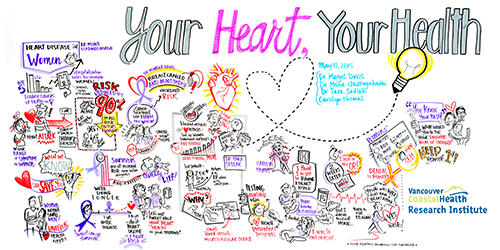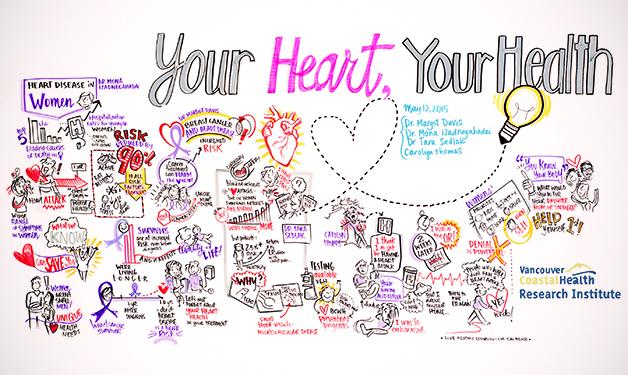
Knowledge translation is key to effective patient care.
High quality health research evidence brings maximum value only when it is put into practice. Knowledge translation interventions involving researchers, clinicians, policy makers, and patients are needed to see positive health outcomes. In order to facilitate knowledge translation around women’s heart health, the Vancouver Coastal Health Research Institute (VCHRI) hosted a public event, Your Heart Your Health, on May 12. The talk not only brought together four of Vancouver’s leading specialists in women’s health and cardiology to share their wealth of knowledge, but it also enlisted the help of patient advocate Carolyn Thomas and graphic facilitator Sam Bradd as knowledge translators who helped the audience understand the information being given and how it may affect or help patients.
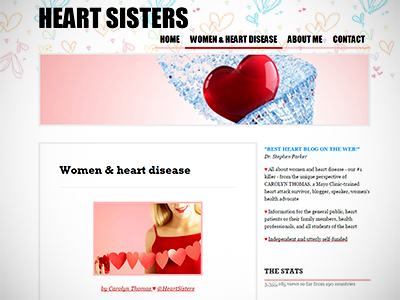
Thomas became a patient advocate as a result of her own personal cardiac emergency misdiagnosis and then discovering how often other women seemed to experience the same life-threatening situation.
“After surviving what doctors call the ‘widow maker’ heart attack and being sent home from Emergency with a misdiagnosis of acid reflux, I felt shocked and angry – but most of all curious – about how this misdiagnosis could have possibly happened,” says Thomas.
“Women are seven times more likely to be misdiagnosed in mid-heart attack and sent home from Emergency compared to men. I knew I had to somehow do my part to help change this.”
In 2008, Thomas became the first-ever Canadian accepted into the WomenHeart Science & Leadership Symposium at Mayo Clinic, which provides training for community educators. She now speaks to health professionals at talks and conferences to help them incorporate the patient experience into their work. She has also written for an international professional audience and is a patient reviewer for cardiology papers submitted to the British Medical Journal for publication.
Thomas’ popular Heart Sisters blog helps to bridge the knowledge gap between health professionals and patients. It offers a patient-friendly glossary of cardiology terminology and acronyms and she provides lay translations of complex medical answers to common heart health-related questions.
Thomas took the health research that had been presented and translated it into something personal. In Thomas, the audience could see themselves, their mother, or another loved one; her story made the day’s information more relatable, understandable, and impactful.
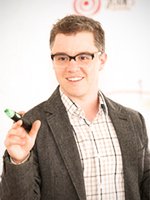
Your Heart Your Health graphic facilitator Sam Bradd had a similar responsibility. Despite the significance of the research itself, and the impact of personal stories, the challenge remained around how to keep the information and conversation alive after the event was over. Bradd met the challenge by creating a high-level visual summary of the event with built-in citations. Essentially, he put the talk into pictures.
“These images take a on a life of their own once the event is over,” Bradd says. “They're hung up in hallways to spark conversations, shared on social media, and printed in reports about findings. All of these ways affect patients.”
Knowledge translation is important to Bradd. He sees his role as helping to create an ongoing conversation between researchers and their communities. Bradd puts dense academic information into plain language and creates context that can be used along with primary-source data like graphs and charts to tell a complete story.
“No one likes to be talked ‘at’ about their health,” says Bradd. “As a patient, I want information about my health care so I can make the best decisions. Knowledge translation is a tool for ensuring patient voices inform researchers, and that good research gets into the hands of people that need it. Any publicly funded research should be accessible to the public, and KT tools – like graphic recording – help with dissemination.”
Since knowledge translation is a two-way dialogue, Bradd’s work doesn’t just record the latest research, but audience input too. It gives validation to people in attendance that they are being heard, lets researchers and patients alike draw new connections between the recorded data, and provides an information resource that is easy to share with a loved one or health professionals.
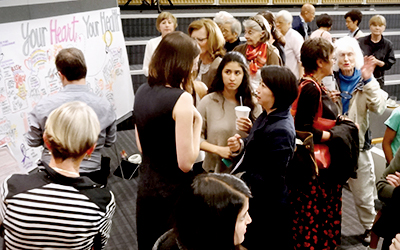
Researchers highlight need for, and benefits of, public interaction opportunities
Cardiologists Dr. Margot Davis, Dr. Tara Sedlak, Dr. Jacqueline Saw, and epidemiologist Dr. Mona Izadnegahdar started the event by presenting new knowledge through easy-to-understand information sharing that was easily accessible to the lay audience in attendance. Each also underscored the importance of such public engagement events and the value of knowledge translation.
“Women are very keen on learning more about their heart and in prevention strategies,” says Dr. Sedlak, director of the Leslie Diamond Women’s Heart Health Clinic. “Public interaction gives women the tools to become more involved in their own heart health – be it through prevention or through active treatment.”
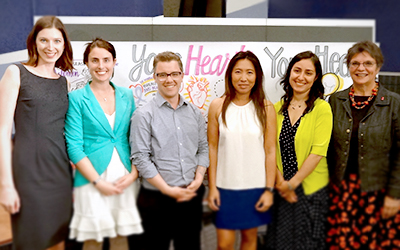
“The good turnout of the participants and the number of questions asked at the end of the talk clearly showed that the public still has strong need and desire to learn more about their heart health and get answers to their questions in an informal setting where they can easily interact with clinicians and researchers,” says Dr. Izadnegahdar. “The talk that evening definitely provided a unique opportunity to have clinicians, researchers and patients all together to increase awareness, answer questions, eliminate misconceptions about heart disease and inform the public about the resources available to them.”
To learn more about the information that was presented at Your Heart Your Health, search #YHYH2015 on Twitter.
Top five things we learned at Your Heart Your Health
- Breast cancer treatments are very damaging to the heart and breast cancer survivors are three times more likely to be hospitalized for heart disease. Survivors need to pay special attention to heart health. – Dr. Margot Davis
- Women can reduce their risk of heart disease by 90% by eating well, controlling cholesterol, getting active, managing their blood pressure, maintaining a healthy weight, reducing blood sugar and not smoking – Dr. Mona Izadnegahdar
- Heart disease is the number one killer of women. It kills more women than all cancers combined. – Dr. Jacqueline Saw
- Cholesterol plaque is not present in 20 to 30 per cent of women who have had a heart attack, so they are often told that they’re fine. They aren’t. They may have an artery tear, spasms or small vessel disease, which may bring serious health problems. – Dr. Tara Sedlak
- Treatment seeking delay behavior is common among women. Women put off their own needs and don’t want to “bother” anyone with their health problems, so they put self-care last. – Carolyn Thomas
